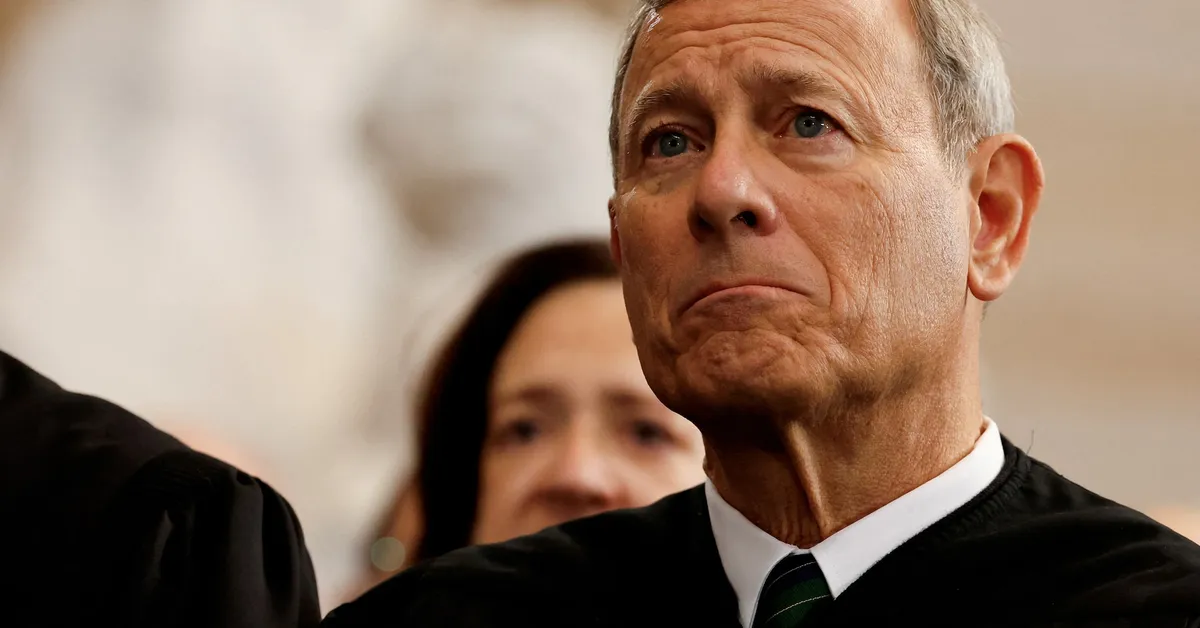
In a significant statement on March 18, U.S. Chief Justice John Roberts publicly rebuked President Donald Trump for suggesting that impeachment of a judge could resolve a court dispute. This rare intervention underscores the growing tensions between the executive and judicial branches, particularly as Trump’s assertions of power continually face judicial challenges.
Roberts emphasized that for over two centuries, it has been well established that impeachment is not a suitable response to disagreements regarding judicial decisions. He pointed out that the proper course of action is to file an appeal rather than resorting to impeachment. This statement came in response to Trump's call for the impeachment of a federal judge on social media.
The controversy originated when U.S. District Judge James Boasberg ordered the Trump administration to cease the removal of alleged Venezuelan gang members. Trump had argued that the removal was backed by an 18th-century law typically invoked during wartime. Judge Boasberg mandated the return of planes carrying hundreds of these individuals to El Salvador, leading to accusations that the Trump administration had defied the court order.
In defense of their actions, the administration claimed that two flights had already departed before the written order was issued, arguing that the judge's spoken directives were not enforceable. Trump, in a fiery post, stated, “I’m just doing what the VOTERS wanted me to do. This judge, like many of the Crooked Judges I am forced to appear before, should be IMPEACHED!!!”
The ongoing tensions have escalated since Trump returned to the White House, with the president and his allies openly criticizing judges who have blocked elements of his agenda. This combative environment has raised alarms among legal experts, who worry that the administration may openly defy judicial rulings, potentially leading to a constitutional crisis.
U.S. Marshals have alerted judges to increased threats in recent weeks, as administration representatives have intensified efforts to undermine the credibility of judges opposing White House actions. Notably, billionaire Elon Musk, a close ally of Trump, and other Republican lawmakers have labeled judges as threats to democracy, with Musk mentioning on social media that impeaching judges is the only way to restore the rule of the people in America.
Historically, the impeachment of judges is a rare event in the United States. To date, only eight judges have been impeached, convicted, and removed, with the last instance occurring in 2010. Legal scholars express skepticism about the feasibility of impeachment proceedings like those suggested by Trump. They argue that a single erroneous ruling, even on a significant national issue, does not meet the threshold required for impeaching a federal judge.
Law professor Jonathan Adler from Case Western Reserve University stated that judges occasionally issue rulings that disappoint political figures, a reality inherent in a system where nearly every contentious political issue finds its way into federal court.
Trump's recent post marks the first instance during his second presidential term where he has advocated for a judge’s impeachment, a demand that received backing from several Republican allies in Congress. Shortly after Trump's remarks, Republican lawmaker Brandon Gill from Texas announced on X that he had introduced articles of impeachment against Judge Boasberg in the Republican-controlled House of Representatives.
Chief Justice Roberts, a conservative appointed by former President George W. Bush, previously defended the independence of the judiciary amidst Trump’s continued criticisms during his first term. In a 2018 statement, Roberts remarked, “We do not have Obama judges or Trump judges, Bush judges or Clinton judges. What we have is an extraordinary group of dedicated judges doing their level best to do equal right to those appearing before them.” He reiterated that an independent judiciary is something for which all Americans should be grateful.
In recent rulings, a narrow majority of Supreme Court justices, including Roberts, have pushed back against Trump’s administration, declining to allow immediate actions that could undermine judicial authority. Notably, on February 21, the court blocked Trump from firing the head of a federal watchdog agency following a judge's order. Additionally, on March 5, the court ruled against the Trump administration's attempt to withhold payments to foreign aid organizations for services already rendered.
As the Supreme Court continues to deliberate on Trump’s recent request to limit judicial blocks on his efforts to restrict automatic U.S. birthright citizenship, the ongoing feud between the president and the judiciary shows no signs of abating.